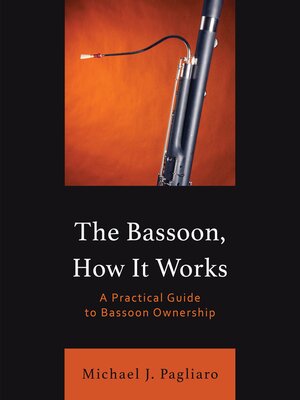The Bassoon, How It Works
ebook ∣ A Practical Guide to Bassoon Ownership · National Association for Music Education
By Michael J. Pagliaro

Sign up to save your library
With an OverDrive account, you can save your favorite libraries for at-a-glance information about availability. Find out more about OverDrive accounts.
Find this title in Libby, the library reading app by OverDrive.



Search for a digital library with this title
Title found at these libraries:
| Library Name | Distance |
|---|---|
| Loading... |
This book provides students and music teachers with a comprehensive overview of the bassoon from its origin to its use and important facts not covered in traditional method books. It can be used concurrently with any method book, expanding the learning experience beyond "learning how to play" to include all topics relevant to the bassoon. These topics include:
The parts of the instrumentHow it worksThe different kinds of bassoonsHow it's madeHow to care for itPlanning a practice sessionA survey of the history of woodwind instrumentsThe accessories needed to play the instrument
An appendix includes a discussion of the science of sound, a glossary of woodwind instrument terms, a dictionary of the subject instrument terms, an illustrated index of the subject instrument parts, and an instrument ownership record. This provides greater insight into that instrument's relationship to others in its family and to those companion instruments with which the player will be working. The enrichment results in a well-rounded musician instead of one who can just play an instrument.
The parts of the instrumentHow it worksThe different kinds of bassoonsHow it's madeHow to care for itPlanning a practice sessionA survey of the history of woodwind instrumentsThe accessories needed to play the instrument
An appendix includes a discussion of the science of sound, a glossary of woodwind instrument terms, a dictionary of the subject instrument terms, an illustrated index of the subject instrument parts, and an instrument ownership record. This provides greater insight into that instrument's relationship to others in its family and to those companion instruments with which the player will be working. The enrichment results in a well-rounded musician instead of one who can just play an instrument.







